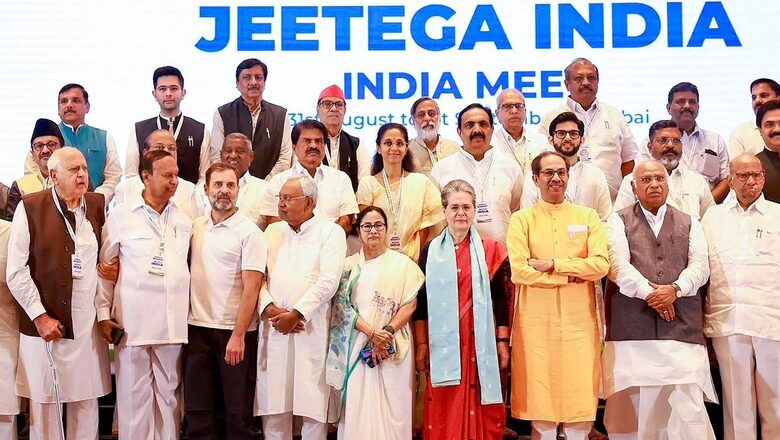
views
The Assembly poll results in Rajasthan, Chhattisgarh and Madhya Pradesh have thrust the Congress party and the broader Opposition alliance into a precarious position. Though the Congress has secured a victory in Telangana, the electoral drubbing in the Hindi heartland has put a big question mark on the prospect of the grand old party and the INDIA alliance in the 2024 Lok Sabha elections.
While the Congress secured a victory in Telangana, providing a silver lining, the overall implications for the larger political landscape are disconcerting. The dismal showing by the Congress party jeopardises its standing within the Opposition alliance. The party had anticipated playing a pivotal role in the alliance’s dynamics, but these election results suggest a shift in the political winds. Other parties, such as the Trinamool Congress (TMC), Aam Aadmi Party (AAP), and Samajwadi Party (SP), are now less likely to accord the Congress the prominent position it had envisioned.
This electoral setback poses numerous challenges for the Congress and the Opposition alliance at large. Questions about their continued existence, future trajectory, and overall credibility loom large in the wake of this disappointing performance. The Congress must now navigate a complex landscape to regain political relevance and re-establish its role within the broader Opposition framework.
The electoral outcomes have provided a fascinating window into the intricate web of complexities and hurdles that await the Opposition alliance and the Congress party in their arduous endeavour to dethrone the ruling Bharatiya Janata Party (BJP) in the upcoming 2024 Lok Sabha elections. In the cacophony of Indian politics, where alliances are forged and shattered in the blink of an eye, the INDIA alliance stands as a beacon of hope for those opposing the ruling party.
Fragile Edifice of the INDIA Alliance
In traversing the intricate terrain of the Opposition alliance, the primary challenge lies in the formidable task of upholding unity among its diverse constituents. The INDIA alliance, a convergence of regional parties championing distinct agendas and aspirations, confronts the imperative of identifying common ground to present a strong and cohesive front against the ruling party. The lacklustre performance of the Congress in the Assembly elections further complicates matters, introducing potential challenges to seat-sharing agreements within the alliance.
The effectiveness of the alliance in formulating and executing a coherent strategy critically depends on maintaining this unity. Without it, the alliance risks veering towards a cacophony of conflicting interests, significantly diminishing its ability to mount a robust challenge against the ruling party.
Within the alliance are regional powerhouses, each holding sway over its own political domain and dedicated voter base. This diversity contributes both strength and volatility to the coalition. Preserving the delicate equilibrium required to bind these disparate parties demands a careful tightrope walk, calling for leaders with adeptness and diplomatic finesse. The emergence of even the slightest fissures in this unity poses a dual threat: not only does it imperil the alliance’s electoral prospects, but it also presents the ruling party with a golden opportunity to capitalise on internal discord within the Opposition ranks.
The Congress Problem
In the aftermath of the state elections, the Congress finds itself grappling with a myriad of challenges that underscore its deficiencies in narrative, credibility, and leadership. The abysmal performance serves as a stark reminder that the party is at a crossroads, facing an uphill battle for relevance and acceptance.
The critical question now looms over the Opposition alliance, with rival political parties hesitating to extend leverage to the Congress in terms of seat-sharing. The lacklustre display has prompted scepticism among these parties regarding Congress’s ability to lead and contribute meaningfully to the Opposition front. AAP and the TMC, among others, are unlikely to acquiesce to the idea of Congress taking centre stage, particularly in states like Delhi, Punjab, West Bengal, Uttar Pradesh, and Bihar. The disastrous outcome underscores a narrative and leadership crisis within the Congress, eroding its standing as a credible alternative in the eyes of the electorate. The prevailing sentiment is that the people of the country no longer perceive Congress as a viable option.
It is imperative to recognise that several Opposition parties, such as the AAP, TMC, RJD, and DMK have demonstrated a more robust ability to contest against the BJP in their respective states. The recent performance of the Samajwadi Party in Uttar Pradesh, while not resulting in victory, raises no questions about Akhilesh Yadav’s leadership and the party’s spirited fight against the BJP. This stark contrast in performance raises concerns about Congress’ diminishing capability to even retain its own stronghold states. The alarming political situation surrounding the party has wider implications, casting a shadow on the cohesion and future of the Opposition alliance.
As the dust settles on the state election outcomes, the very foundation of the INDIA alliance is called into question. The onus is now on the Congress to introspect, regroup, and present a compelling narrative to regain the trust and confidence of both its alliance partners and the electorate. The road ahead is fraught with challenges, and the party must navigate it with strategic foresight to remain a formidable force in Indian politics.
Possible Leadership Crisis Within Crisis
The recent underwhelming performance of the Congress in the Assembly elections may prove to be the tipping point that triggers a profound leadership crisis within the grand old party. Already contending with internal dissensions, this setback has the potential to exacerbate existing challenges and plunge the Congress into a period of internal turmoil.
The implications of such a crisis extend far beyond the confines of Congress itself. The Opposition alliance, already treading on shaky ground, is now at risk of further destabilisation. A fractured Congress leadership could erode the alliance’s ability to present a cohesive and united front against the ruling party, rendering it vulnerable in the face of political adversaries.
Despite its storied history, the Congress is not impervious to the evolving political landscape. The erosion of its support base in key states not only weakens the party’s electoral standing but also jeopardises the very bedrock upon which the Opposition alliance is built. The ramifications of Congress’ electoral decline extend beyond its own fortunes, reverberating across the larger political spectrum.
A leadership crisis within the Congress would not merely redirect the party’s focus inward; it could also cast a looming shadow of uncertainty over its commitment to the broader Opposition cause. The cohesion of the Opposition alliance relies heavily on a strong and stable Congress, making any internal discord a cause for collective concern.
As the Congress grapples with the aftermath of the electoral setback, the Opposition alliance faces the formidable challenge of finding a unifying leader from within its ranks. In the absence of a central figure, the potential for competing ambitions among various leaders may introduce an element of chaos, making it even more challenging for the alliance to present a united front.
In these uncertain times, the Congress must navigate the treacherous waters of internal discord with a keen awareness of its broader impact. The Opposition alliance, in turn, must brace itself for the challenges ahead and strategise to overcome the fallout from the Congress’ electoral woes. The political landscape is evolving, and how the Congress addresses its leadership crisis will undoubtedly shape the course of Opposition politics in the foreseeable future.
Confusion in Strategy: The Achilles Heel of Opposition
As the Opposition alliance grapples with the intricacies of unity and the Congress contends with its electoral challenges, a more insidious enemy lurks within: the lack of a coherent and consensus-driven strategy. The Opposition’s current strategy, which is characterised by ambiguity and uncertainty, poses a threat to the alliance’s effectiveness. The absence of a unified strategy has left Opposition members and voters alike perplexed. The failure to present a clear and compelling narrative on key issues has eroded the alliance’s credibility. Whether on economic policies, social justice, or foreign relations, the Opposition’s lack of consensus has created a void, allowing the ruling party to dictate the narrative.
The current strategy, or lack thereof, only deepens the existing doubts among voters about the Opposition’s ability to govern cohesively. As the Opposition political parties grapple with these internal fissures, a pressing question looms large: whether they will prioritise formulating a seat-sharing strategy or contend with the lingering hesitancy, confusion, and a perceived high-handed attitude from the Congress. The intricate dance of political negotiations continues, with the Opposition still navigating the tumultuous terrain of internal consensus.
Strategic Missteps and Lost Momentum
Within the Opposition’s own fold, there is a chorus of criticism directed at the current strategic approach. The conspicuous lack of coherence and coordination among the alliance partners has sown seeds of confusion and doubt, dealing a severe blow to the overall effectiveness of their campaign endeavours. This strategic disarray, compounded by a palpable loss of momentum, paints a picture of an Opposition that finds itself adrift, its initial fervour fading into the background. The defeat of the Congress in three major states also raises questions about the credibility of the party and the Opposition alliance.
The uphill climb to regain momentum and craft a compelling narrative poses a formidable challenge for the Opposition. In contrast, the BJP, leveraging its formidable resources and adept messaging, consistently outshines its rivals in the ongoing battle for public opinion. To break free from this cycle of ineffectiveness, the Opposition must go beyond mere criticism and proactively articulate a clear and coherent vision for the future of India. Such a vision should resonate deeply with the aspirations of the electorate, offering a stark contrast to the ruling party’s narrative.
The clock is ticking, and the Opposition’s ability to rekindle enthusiasm and present a compelling alternative will undoubtedly shape the trajectory of the upcoming political landscape.
Difficult Future
In the intricate tapestry of Indian politics, the challenges confronting the INDIA alliance and the Congress party transcend the immediate electoral arena. The imperative to maintain unity, the Congress’ central role within the alliance, the looming threat of electoral setbacks triggering a leadership crisis, the absence of a cohesive strategy, and the waning momentum collectively form a daunting obstacle.
The path forward necessitates a profound re-evaluation of political strategies and a proactive approach to address internal fractures. The Congress, positioned as the linchpin of the alliance, must deftly navigate its internal dynamics to emerge not as a source of discord but as a unifying force. The INDIA alliance, with its latent potential, stands at a pivotal juncture in history. The decisions taken in the ensuing months will not merely shape the fate of the Opposition in the next elections but will wield a profound influence on the trajectory of Indian politics for years to come.
The challenges are monumental and commensurate with the high stakes at play. This juncture poses a litmus test for leadership, strategy, and resilience—a defining moment that will ascertain whether the Opposition can metamorphose from a fragmented coalition into a cohesive force capable of steering the nation in a new direction.
In the labyrinth of political dynamics, the Opposition stands at a crucial crossroads, teetering on the edge of historical pitfalls. The peril lies in affording the Congress and the Gandhi family an unequivocal influence, as this path threatens to echo the regrettable narrative of previous governance failures. The aftermath of the recent state election unequivocally signals that the Congress is haemorrhaging credibility at an alarming pace, rendering it an arduous task to mend the inflicted wounds before the impending 2024 general elections. It is imperative for the Opposition to glean valuable lessons from the annals of history to avert a replication of past mistakes and forge a more promising trajectory forward.
The author, a columnist and research scholar, teaches journalism at St. Xavier’s College (autonomous), Kolkata. He tweets at @sayantan_gh. Views expressed in the above piece are personal and solely that of the author. They do not necessarily reflect News18’s views.

















Comments
0 comment